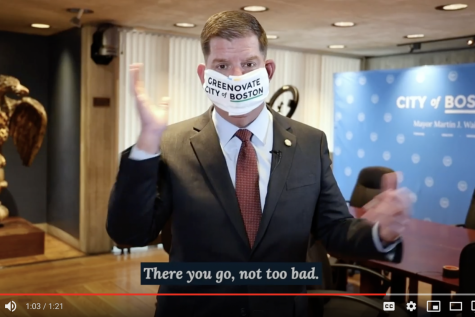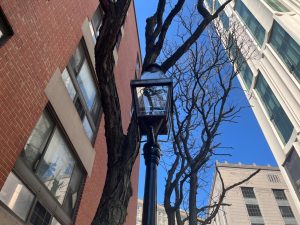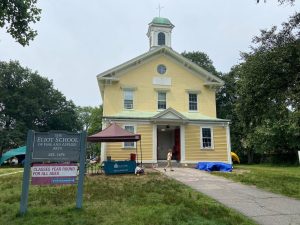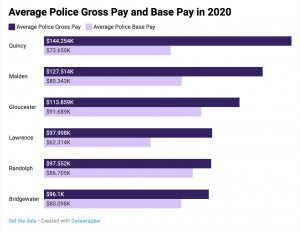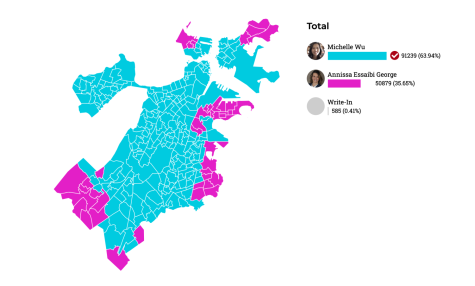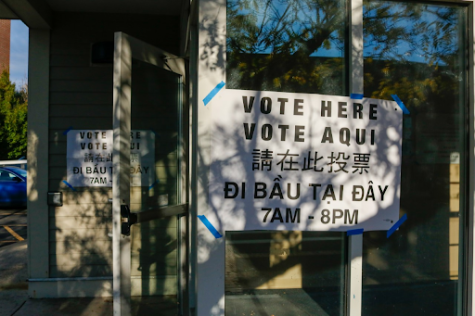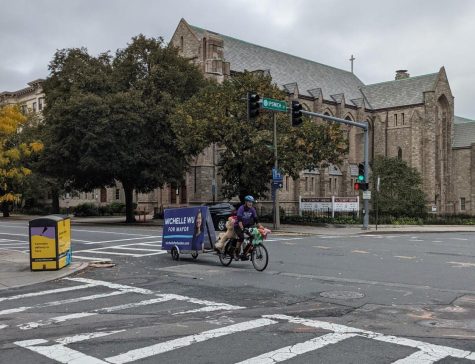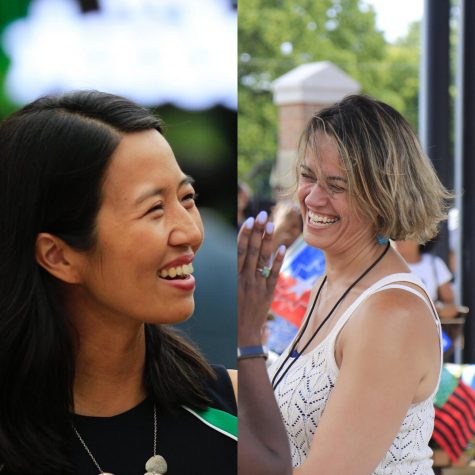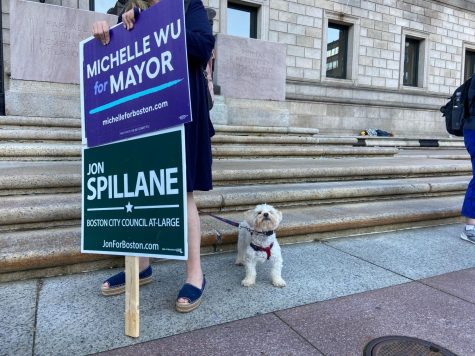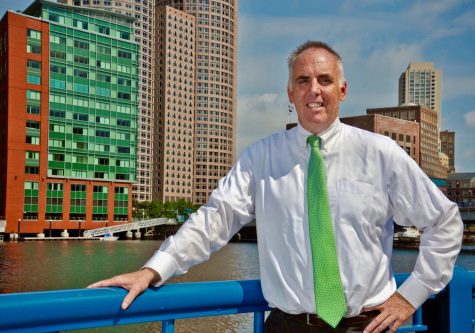City council race: Eric Porter running for District 9
September 8, 2021
Eric Porter, an entrepreneur and business owner from Allston, is running to be the next District 9 City Councilor.
Porter is running against the incumbent Councilor Liz Breadon, Michael Bianchi and Sarah Iwany, running as a write-in candidate.
Porter grew up in the metro Detroit area and went to college at the University of Southern California but said Boston is the only city he ever felt comfortable living in. “Allston-Brighton just has a great community of free thinkers and artists and musicians, and that just allows you to kind of be who you want to be without being judged,” he said. “When you go to other parts of the country, you’re expected to, maybe in a certain neighborhood, make so much money and act a certain way.”
His campaign’s top issues include affordable homeownership, neighborhood development and safety issues around the recent developments in Allston-Brighton.
“With affordable ownership, you get people in, and for 30 years, their rent never changes. That’s the best form of affordable rentals: affordable ownership,” he said. “And then you’re building a community of people who are contributing to the neighborhood; they [are] more invested.”
The Scope spoke with Porter about his campaign’s top issues and plans to address them if elected city councilor of District 9. This interview has been edited for length and clarity.
What has your experience been living and working in the city of Boston?
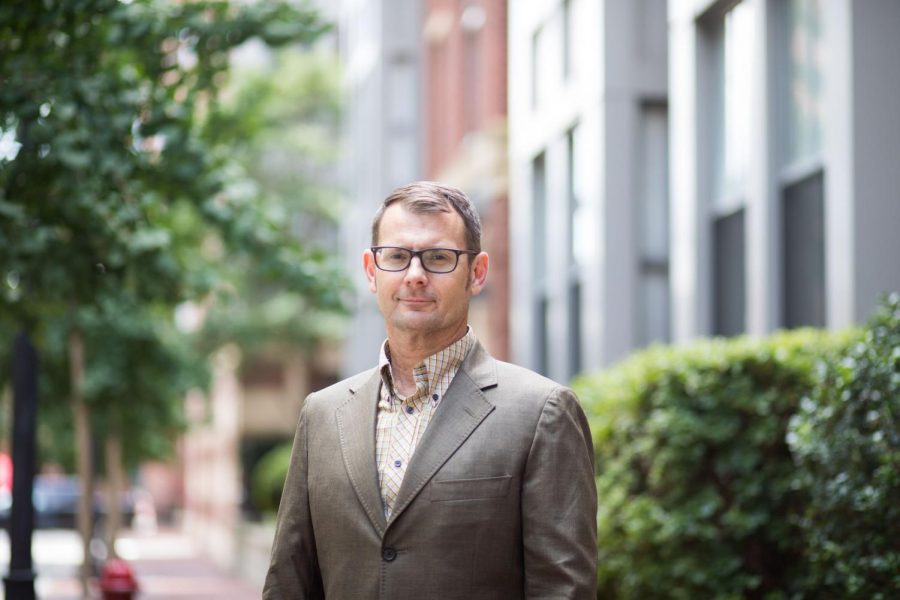
I’m very comfortable in Boston. It’s a city with a big reputation, but it’s actually a relatively small city, and it has just a lot of huge benefits. You have so much schooling, so much technology, so much science going on, a great, diverse population, largely highly intelligent. I think that is just a really amazing mix. Being small and yet [having] a big reputation with a huge skill set makes Boston unique.
Boston, for me, is just a very, very comfortable place to live. And really, Boston is the only place I’ve ever really felt comfortable living. It is just a really good fit for me.
Allston-Brighton [in particular] has a great community of free thinkers and artists and musicians, and that allows you to kind of be who you want to be without being judged. So when you go to other parts of the country, you’re expected to, maybe in a certain neighborhood, make so much money and act a certain way. And Boston, New England, and especially Allston is not like that, so you can sort of be who you want to be.
What motivated you to run to be District 9 City Councilor?
I think there have been some major changes in the last seven years that have affected people. For well beyond seven years, I think the City Councilor in our District has kind of ignored what the role is, and I usually start the conversation with the role of the city councilor to represent the people.
A massive amount of construction has been foisted upon the people in Allston-Brighton, right? Nobody has the time to attend three to four meetings every week with two days’ notice. They just can’t drop their life. People have to go to meetings; they have to go to work. They have other things going on in their life. So all of this construction was really foisted on the city and the residents, and they didn’t have a choice in the matter. They could put up a little bit of a fight, but most likely, they really couldn’t stop it.
That’s a really unfortunate thing because [the city councilors] weren’t representing the people, which is what the city council is supposed to do. They are supposed to represent the people. So again, my concern is you have all this construction; some of it will go back to the bank. Now, what’s going to happen? Because the growth rate is not attainable. It’s impossible.
It’s not realistic to try and increase the population in five to 10 years by 40 to 50%. If you’re going to try and do that, you’re really going to have to deal with some major, major safety issues that I don’t think are being addressed.
But my joke is, you know, if the city wants to get rid of the Boston Common through enough meetings, they basically can bulldoze it because people will just eventually give up. And that’s kind of what happened. People have to go to work. They can’t, in two days’ notice, go to a meeting to defend their house. And that’s a problem. The other thing that I see coming down the road is a lot of these buildings are going to go unrented and are going to go back to the banks, which someone said, ‘Well, that’s that’s not possible.’
Well, it happened in 2008. And it happened in the late 80s, early 90s, here in New England. So it can happen again. I don’t think you can increase the population by 40 – 50% in an extremely short time period. That has never happened in Boston, going back to the 1600s. So if it didn’t happen in the 1600s, when a boatload of pilgrims and Puritans could pull in and double the population, I doubt it’s gonna happen. I don’t think it’s possible, and you can’t pile it all into one area all of a sudden, right?
So now we have to decide what’s going to become of these buildings. What I would love to see, which I’ve been talking about for a long time, is affordable ownership — where instead of getting people affordable rentals that they’re always dependent upon the government every single month for some help or assistance, or the landlord when they build the buildings, a year later figured out how to weasel out of affordable rentals.
With affordable ownership, you get people in, and for 30 years, their rent never changes. That’s the best form of affordable rentals: affordable ownership. And then you’re building a community of people contributing to the neighborhood. They [are] more invested. So, instead of a turnover every year, you have people who stay, and then you have less trash left, less issues with move-ins and move-outs. Everything that comes from it is just really endless. The benefits are endless.
I think some of these are the things that we’re gonna have to deal with over the next two to five years.
Besides affordable homeownership and development in the Allston-Brighton area, are there other priorities you’re planning to address if elected?
Yeah, one of the issues around development is safety. Let’s talk about safety issues because it’s come up recently. We had that fire [in Brighton] a couple of nights ago. So there are a lot of issues around safety with all this construction, again, water, sewer, fire, police, streets, electrical, infrastructure, all this infrastructure, and then again, do we have enough police? If you’re going to increase the population by 40-50%, it includes increasing the police by that percent. Are you going to increase social services to complement the police? Do we have enough fire[fighters]? You’re now building 10 to 16-story buildings. Do we have the fire equipment to handle that?
So the safety issues are massive, and it’s being overlooked. People don’t recognize how important it is — you’re trying to increase the population by 40-50%, and you’re not addressing any of these safety concerns. It’s horrible.
Taxes have increased in the last 10, 15 years by fourfold. So there should be plenty of money in the budget for it. So you’d have sort of the money for it; you’re increasing the tax, property tax revenues by doing all this construction, so assumably, your tax base would go up also 40 to 50%. So you should have plenty of money for the safety issues that need to be addressed.
Transportation is always an issue. I think you need to — I don’t think anybody’s really been honest about transportation — you need to sort of take a look at it and say, many, many smart people worked on this for years and years and years, and you need to get to some realistic point [of] what can it be? What can we achieve? And what can people expect? And that’s where you kind of need to start and then start working towards the improvement.
But by making false promises, like, ‘I’m going to improve the subway system or the bus system.’ Again, you’re going up against decades of people, smart people, working on it, so you really have to sit down with them and say, ‘What’s doable? What’s workable?’ And then you put it out to the community, and the community has a groupthink. I love groupthink. So the community has the ability to say, ‘Hey, we’ve tried to put that out, you know, they can come up with their own ideas.’ I think that’s a great option, too.
How do you plan to work with other city councilors to implement your policies if you’re elected?
Each issue is its own separate issue. So, some issues you work together with a city councilor on and some issues you don’t. So let’s say something straightforward, like a rat issue. The rat problem in Allston-Brighton, well, that’s something that the whole of the city councilors can get around; people generally want to eradicate rats. So with that, you can come up with your neighborhood plan and work with the city, other city councilors and help them implement their neighborhood plan. And then, as a group of city councilors, approach the City Hall and say, ‘Hey, here’s a plan that we have, here’s how we’d like to [handle it].’ So each issue is different.
That’s how you’re going to have to handle it. There are issues in other Districts, such as the Seaport — they have issues with water and the ocean. I can support them, but I can’t speak towards that issue because it’s not a concern for my neighborhood’s people, and I’m representing my neighborhood.
So each problem is different and how you deal with each problem with other city councilors is how it relates to them to work together as a group and then approach the city.
How do you plan to work with residents in your District to implement your policies if you’re elected?
For me, the beginning is that the City Council represents the constituents, so you have to be accessible to a broad range of constituents, not just a few loud voices. In some cases, you have to almost reach out to people who have their heads down [and] who are just working. They have an opinion; everybody has an opinion. Everybody sees things differently, and they recognize certain problems, but they don’t have the time or energy to put their voice in.
But being able to reach out to those people and get their view, you’re really providing better representation. So, one of the questions [I received] from a different organization was, ‘Will you set up an office time in the District?’ I don’t know [if] that’s necessary. What’s necessary is being accessible, being available to listen to the constituents.
It doesn’t really matter where I am in Boston. What matters is being available to these people. And in being available, I would also want to be proactive, which is reaching out to people who don’t have a loud voice, who aren’t the squeaky wheel and try and get them to give an opinion so that they are actually represented. Those are the people who are most affected by a lot of these changes because they didn’t have a say in the matter, because of time, because of a disability or because they have other priorities in their lives. Those are the constituents that I also want to represent. So I think that’s how I would act, [to be] available and proactive to the people who aren’t the squeaky wheel.
You are an entrepreneur and a business owner. How would those experiences from the work you do help you in your job as a city councilor?
When you’re an entrepreneur, you’re wearing a lot of different hats — you have to be an accountant, you have to be a decision-maker, you have to be a coach, you have to be a teacher, and you have to manage the vision of where you’re going. You have to have marketing all of these elements.
Being that type of person really gives you the ability to sort of assessing problems and then come up with a solution to those problems for, or in some cases — again, that’s an expectation — this is as far as we can go with.
If nothing else, I’ve been very honest about my direction. I’ve been very honest about how I see things. It’s because I come with such integrity, and I come with such altruism that it’s very easy for me to be honest about my views. A perfect example of that is affordable ownership. People have pushed against me, against affordable homeownership, because they want rentals or whatever they want, bigger buildings.
I know in my heart, without a doubt, that affordable ownership will always be better, short term and long term, [than] affordable rentals. Because nobody can take it — as long as you’re paying your mortgage — nobody can take it away from you. In 30 years, your payment is still the same in general. You have to negotiate all of these things. All of these elements play into why this lends itself well to being a city councilor.
Also, I’ve been a renter in Allston, and I’ve been a landlord. So I’ve seen both sides of that coin. I’ve always educated my tenants about tenants’ rights. Because a lease is no different, and it’s exactly like a contract agreement. Unfortunately, both landlords and tenants make this an emotional issue, [and] to some extent, [it’s] understandable. But it’s really not. Here’s what you’re supposed to do, here’s what I’m supposed to do.
That’s it; you just handle it almost like a business. There are plenty of laws in favor of the tenants. The tenants are actually very well protected if they’re educated. Everybody is talking about new tenant laws and rules, and you don’t need them. All you need to do is enforce the current laws.
So you have a law in the book right now, or you have a zoning regulation in Boston, [which prohibits more than four undergraduates living together in one apartment]. However, down the street from me, you have six [undergraduate students] moving into an apartment in deplorable condition. Whose fault is that? It’s the landlord. Who is also at fault? Those six students are violating the maximum of four people, four undergrads living in one unit. They also have some blame because they’re violating the city ordinances. We can also blame the parents. Parents are allowing that to happen. They may not know the rules, but they’re obligated to know the rules.
Who’s also to blame? The university. The university should be educating the students and parents, saying, ‘Hey, this is not legal.’
So when those six students move in, who’s responsible, because of this law, who’s responsible if something happens, if one of them dies, if there’s a fire, if there’s a sexual assault… who’s at fault? The mayor, because she was across the street talking about it. The ISD (Inspectional Services Department) and the university, none of them are enforcing those rules. Who’s financially liable? The university and the city if something happened to any of those students, and any of their guests, anything that happens in that apartment because they all know that it’s going on, and did not take any preventative measures. They’re choosing not to enforce one of their own ordinances in a serious matter.
As a landlord and a renter, I see both sides of that coin. I’ve owned buildings that had more than four bedrooms, so I know it’s possible to rent these bedrooms, these apartments to non-undergrads. It’s not hard. I’ve done it for more than 10 years. I’ve done it since the law. So, landlords can’t cry, ‘Oh, we can’t rent these big [apartments].’ You can; you’re just taking the easy route. So they have to hold the landlords accountable. They have to hold everyone else accountable, too. I really believe that four undergraduates living in an apartment is an excellent ordinance, and it needs to be enforced.
We’ve been talking about making changes once you’re elected, but what do you think is working well in District 9 that you will preserve?
I like old things. So I’ve really put up an effort to preserve a lot of things in the neighborhood. I think we need to preserve more. I talked to the Preservation Society, and I talked to the awesome Historic Society. We need to put more effort into preserving things and appreciating some of the historical nature.
An unfortunate example is that two buildings were supposedly part of the Underground Railroad — and I have to emphasize the word supposedly — but they were demolished, without investigation, to build a new building. Nobody investigated [whether it’s] fact or fiction, and now, we lost that piece of history in Allston-Brighton. Potentially, we had two buildings that were a part of the Underground Railroad, which is, I think, an important thing to recognize. But that was lost.
In terms of preserving other things, too… we’ve been losing some of the music and art stuff. In preserving that, I would have loved to see some of the buildings, which, again, we still can turn into artists’ co-ops as they have in Somerville. So now you have a building that the artists control, and they sort of have a vetting period for allowing certain people to buy and contribute to that community. It’s a great thing for any community because now you have open houses, and you have an area where people can live and create art and benefits.
On one level, I think what’s going on in North Allston is fabulous with all the technology and what have you. There’s a lot of growth that can be had there, too. I think that that needs to be preserved and expanded upon in terms of business that needs to be expanded.
Is there anything else you want to share that I didn’t ask you?
I don’t think so. I can go in so many different directions and pontificate for an extended period on a lot of things. I’ve hit some of the important issues: development and safety, maintaining community and building ownership.
I don’t know if this has come up to you, but I assume you have heard that we have the lowest [owner-occupied rate] in all of Boston. Allston is probably less than 10% owner-occupied. Where I live, specifically, it’s 1 to 2% owner-occupied in my neighborhood. I’m lonely. You know, how do you get…if somebody next door is more than half your age and they’re gonna disappear in four months. You know. So that’s a big issue for me.





